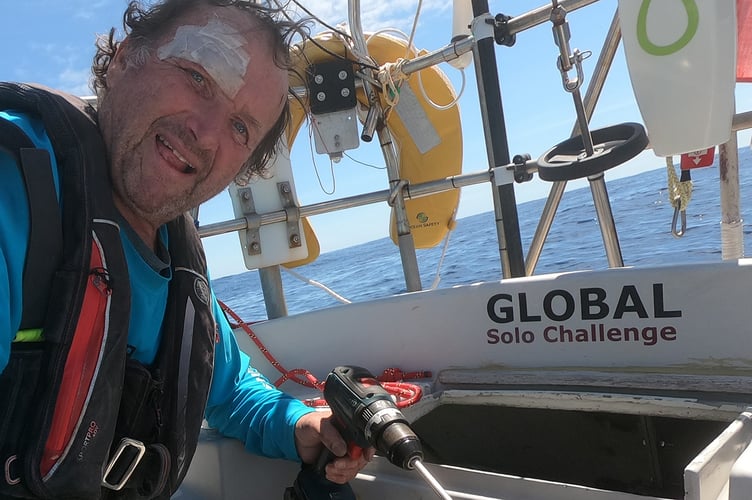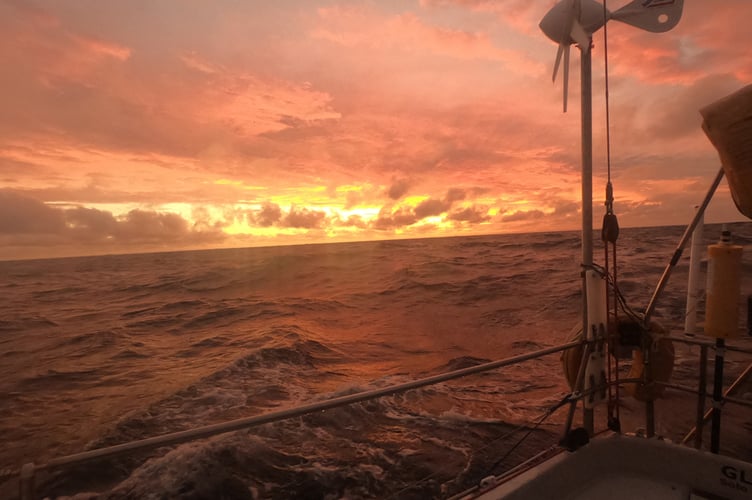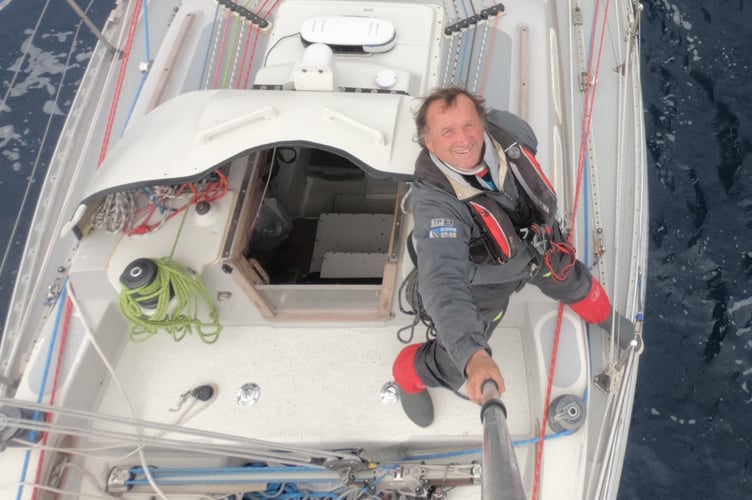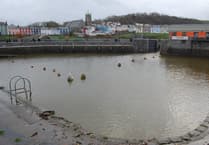Having returned from his globe spanning odyssey, solo sailor Dafydd Hughes spoke to the Cambrian News about the experiences, challenges, ‘incredible’ beauty, and the ‘brutality’ of sailing halfway across the world, confined to a 10 metre long boat - all day, everyday.
The 63-year-old Talybont man has spent the last three years preparing to take part in the Global Solo Challenge, where sailors compete to sail 26,000 miles across the globe in 200 days. In 2020, shortly after finding out about the competition, Dafydd bought the boat that would carry him across the seas, the Bendigedig, a 1971 Sparkman and Stephens 34 that hadn’t seen the sea for over 18 years.
Dafydd was flying ahead in the competition, and looked like he might earn a podium spot with his performance. Until his journey was cut short after the Bendigedig, meaning brilliant, suffered a technical fault 700 miles off the coast of Australia.
He said: “There was a sudden failure in the electrical components of the rudder reference unit. The unit tells the boat’s onboard auto pilot system what angle my rudder is at. Without that feedback, the autopilot can’t function. I was still able to sail manually, but you can’t spend all 24 hours of the day sailing manually, you’ve got so much other stuff to do, on top of trying to get a good night’s sleep.
“I was looking like I’d earn a podium finish, so it was especially gutting to have to pull out. But it was never a goal of mine to finish on the podium. My goal was to go out there, enjoy the experience, and hopefully inspire someone else to go out and experience their own adventure.”
For a man confined to a boat all day everyday, Dafydd had plenty to do each day to keep him busy. Everyday he would check his ship top to bottom looking for anything that needed repair, calibrate his sail to the predicted weather, and face the challenges of cooking food on a boat being knocked and rocked in all directions by the sea.

Describing his daily routine, Dafydd said: “Each day would start at first light. I’d check the weather and download updated weather files. Once I had an idea of what to expect, I would change the sails accordingly.
“There’s always plenty to do. I’d walk the boat everyday checking to make sure everything was ok, and make repairs or do maintenance work where it was needed. The boat is constantly moving and rocking, it’s always being stressed out. Sea water kills everything too, so something would always need maintenance.”
Travelling across the ocean on a sailboat poses a variety of challenges, from being woken up to the sound of alarms which could be drawing your attention to anything from a fault on the boat, the potential for a collision on the boat’s current course, to changes in wind or the sea rocking the boat.
“It’s quite difficult to get the point across to someone who hasn’t done it, the experience can be quite brutal. There was no running water, no tv, no sofa, and I prepared food from a small cooker. It was wet as well, condensation forms on the inside of the boat and soaks everything. It’s a constant battle.
“Even trying to do a simple thing like putting muesli into a bowl, you have to be aware of the movement of the boat, and you can’t put the bowl down or it will fly across the boat. If you’ve got it in the bowl but forgotten your spoon, you’ve got a real problem. You can’t put the bowl down, but you need both hands to get up, so what do you do?
“Muesli was my ‘go to’ meal, but I was also living off dried food. I couldn’t have tinned food because the tins would rust. The tins I did bring completely rusted through within two months. If I had done the full course, that would have affected me because it reduced my food stock without me having even used it. I would have had enough fuel to keep going, but it wasn’t necessarily food.”
The challenges Dafydd faced would go beyond ensuring the Bendigedig was fully functional, and that he was fully fuelled. One of the biggest challenges Dafydd faced was the months of isolation, and crumbs of outside communication he had available through email, and a limited amount of both signal, and minutes available on his satellite phone.
“The isolation was quite nice sometimes, you are the king of your own boat. You make all the decisions, but at the same time, if something needs doing, no one is going to do it for you. Even just the little things, no one’s going to make you a cup of tea or cook your dinner.
“You miss other people, like looking into someone’s eyes and having them smile back at you, putting a reassuring hand on your shoulder, you miss those little things a lot. It was complete isolation, because I had a limited budget for communication. I had about 50 voice minutes a month, which worked out to about two minutes a day, and the connection wasn’t exactly consistent.
“I couldn’t go on the internet, only for very basic things like downloading the updated weather forecasts, and writing an email. You could tell me anything was happening back on shore, and I would have to take your word for it.
“In a way, it was nice to be cut off from that, I was immersed in mother nature. I missed the whole of the rugby world cup, which was unthinkable back at shore. I’d watch every game. But out there, I asked myself how relevant that was to my life. I once would have seen who wins the tournament as something critically important, but is it?”

But being at sea isn’t only a mental challenge, it’s also physically challenging.
“Being at sea is hard work on your body, all your core muscles are working all the time to counterbalance against the rocking of the boat.
“It’s like sitting in the car as you go through a series of sharp bends, you’d sway from one side to the other. The only time that stops is when you lie down on the bunk. Of course you are still rocking, which can make it hard for some people to sleep, for me though, it helped rock me to sleep. You have to sleep on your back though, the movement of the boat would rock you out if you slept on your side.”
It was crucial that Dafydd kept a positive mindset, he said that if you lose that positive belief, being out at sea could ‘break’ you.
“You’ve got to always wear your rose tinted glasses, or it’s going to break you mentally. There’s a constant anxiety that you can’t let grip you. You could lie on your bunk and look at a piece of equipment and think ‘what if that breaks?’ Then you ask the same question about another piece of equipment. You can’t afford to do that, if for no other reason than because it chews up a lot of energy.
“You’ve put yourself in the middle of a force that is far, far greater than you, a force you’ve got no control over whatsoever. There’s no winning against the sea. My partner says all ocean racers are masochists, it’s cold, wet, and a horrible environment. But there is something that draws us to it, I had to do it. It’s a need to explore, but it’s not just exploring the world, it’s exploring yourself - how far can you go?

The ‘brutality’ of Dafydd’s experience made him reflect on how difficult life must have been for sailors of the past, who did it without the modern technology and knowledge he took on board with him.
“I spent a lot of time thinking about the people who jumped on big ships three or four hundred years ago. They wouldn’t have known if they could sail home, or if they’d run out of water. They were unbelievable people.”
Though the journey posed a variety of challenges, the experience left him feeling ‘blessed’ as he got to experience many ‘incredible’ natural beauties.
“The main thing I learned to value while I was out there was nature itself, the joys of what it can show you, throw at you, challenge you with and surprise you with.”
“I saw the Milky Way in all of its glory, I had dolphins swimming alongside the boat. In the night, I would also see the phosphorescence of the water, which made it look like it was sparkling. It happens when a sea living organism gets disturbed, almost like a firefly. It makes the sea sparkle. If you get a dolphin swimming through it, it’s just incredible. It’s an alien world out there, and these are experiences you can’t buy.”
The lesson of enjoying life’s simple pleasures didn’t leave Dafydd once he returned to shore. The first thing he did once he returned was treat himself to a meal, and a well overdue ‘long’ shower.
“After I cleared customs, I got the boat tied up somewhere I knew it was safe. Then I went out and got a big fat burger with chips. Then I had a very long shower for about 40 minutes. There was no running water on the boat, so that was quite a luxury.”
Having returned to the UK after his sea-spanning odyssey, Dafydd is now back at home, enjoying the company of his wife and family, which, after everything, have only come to mean more to him.




